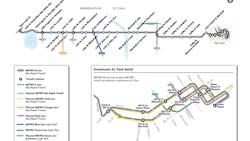Met Council approves final METRO B Line plan
The final corridor plan for the METRO B Line was approved by the Metropolitan Council (Met Council), including all 33 stations and routing.
The project now moves into the detailed design phase, which will occur into 2022, with construction in 2023 and service anticipated to begin in 2024.
The B Line is a $65 million bus rapid transit line that will substantially replace local bus route 21. The B Line will connect Uptown in Minneapolis with Union Depot in Saint Paul, operating primarily along Lake Street in Minneapolis and Marshall and Selby avenues in Saint Paul.
The approved plan built upon over 2,500 community comments and coordination with cities and counties.
Potential bus lanes on Lake Street still being evaluated
The final plan does not include any changes to station locations included in the July 2021 recommended corridor plan, but does include updates based on feedback from project partners and community members:
- Responses to comments about specific station locations, including issues to address throughout the detailed engineering phase.
- More on continued evaluation of bus lanes on Lake Street in partnership with Hennepin County and the city of Minneapolis.
Approval of the plan does not finalize decisions about bus lanes, but sets stations in the best locations to accommodate them. Metro Transit, Hennepin County and the city of Minneapolis are continuing to work together to address multiple goals for the Lake Street corridor, including:
- Transit speed and reliability;
- Pedestrian and traffic safety; and
- General mobility improvements.
Project managers anticipate that county-led advanced technical analysis will be completed by end of 2021 with additional public communication to follow.
B Line service projected to be 20 percent faster
Route 21 is Metro Transit’s second busiest bus route with about 10,000 daily rides in 2019, but it runs in a corridor with an average speed as low as eight miles per hour during rush hour. The B Line aims to make service about 20 percent faster.
BRT improves the transit experience by providing faster, reliable service every 10 minutes, seven days a week during the day and most of the evening, on streamlined routes with upgraded stations and onboard amenities.
